SUMMARY
This is AI generated summarization, which may have errors. For context, always refer to the full article.

Compared to the other “class enemies” on its hit lists, no one has raised the dudgeon of Filipino communists than retired Army general Jovito Palparan. There is fury in much of the leftwing commentaries about Palparan. You have this sense that this wrath towards the berdugo is not simply ideological. It is personal.
Yet, to personalize political animosity can also cause problems. It goes against the grain of an organization that distinguishes itself from others parties by regarding its opponents in ideological and political terms. Individuals are subsumed under a broader category – classes – and their actions are those done in the defense of their class interests. Hence, the Left’s “people’s war” against Benigno Aquino III is not aimed at the eliminating the president per se. It is directed at destroying the domination an oligarchy (in which Aquino is the most prominent representative).
This explains why some communist intellectuals have tried to ”broaden” the discussion of Palparan beyond just simply calling him berdugo. They say that even if the government had captured Palparan, this did not mean the former is deserving of leftwing kudos. For, in truth, Palparan is a symbol of state impunity. The very government that captured him is, therefore, a co-conspirator in his bloody rampage. The captor and the captured are both guilty, and therefore must face justice.
This passable argument however was undermined of late by the more outrageous version of the Kilusang Mayo Uno. The leftwing sect charges the government of “coddling” the general for some time until it was forced “to surface Palparan to score some brownie points from the people” and distract them from the Disbursement Acceleration Program controversy. This is not only unbelievable; it is also dubious since the source has very little credibility to stand on. It once defended the Chinese government’s massacre of students at Tiananmen Square.
So we are back to the question: how does one explain this personal and intense hatred and where exactly is it coming from? I think it is not just because of Palparan’s alleged role in the killing of Sherilyn Cadapan, Karen Empeno, and Eden Marcellana.
For over 40 years, communists and government soldiers have been engaged in a war on a daily basis in areas where the NPA has been organizing communities. When Palparan was given command of the 7th Infantry Division (which, in an obvious nod to the Nazi’s Sturmtruppen, adopted the name “Storm Troopers”), he continued the same aggressive forays against the communists that nearly destroyed the CPP’s regional organizations in Samar and Leyte.
Zeal for combat
Palparan was not an officer who rested on his laurels and be content with being armchair warriors after their promotion to senior positions. He was always out in the field conducting operations.
In the eyes of his comrades, this was an exemplary record that began when he was activated from the reserves and assigned to Basilan and Sulu at the height of the Muslim separatist war, to his stint two decades later as commander of the 204th Army Brigade in Mindoro and Romblon (2001-2003), commanding general of the Army’s 8th Infantry Division in Eastern Visayas. Palparan then headed a 51-man Philippine Humanitarian Contingent that was sent to Iraq as part of George Bush’s “Coalition of the Willing,” and after he returned to the Philippines was assigned as the major general overseeing the 7th Infantry Division in central Luzon.
In his entire military career, Palparan thus knew nothing but combat. While many an officer often “mellows down” once he reaches senior status, Palparan went the other way. He continued to relish engaging communists in the most brutal of terms the enemies of the state. He was the Right’s equivalent to New People’s Army (NPA) commanders who are utak pulbura.
But this was not all that there is. The Communist Party of the Philippines has encountered many a middle-level and even senior Armed Forces of the Philippines officer who is quite pragmatic when dealing with the insurgents. (How else does one explain the NPA’s boast that most of its firearms have been bought from the AFP?). In Palparan you have the opposite of the opportunistic commander.
His zeal for combat has been matched by an ideological commitment to the status quo. He sees no need to justify the means of communist suppression that he uses, because in the end these were methods that will help preserve “Philippine democracy.” He was, in a way, one of the best cadres of the Right.
This may explain why the communists hate the berdugo that much. They see in him an enemy committed to waging a “thousand-year war” against them. In Palparan they see a rightwing version of their own ideological fanaticism and passion for the gun. He is, in a certain way, their mirror image.
And almost always, the desire to destroy that which reminds you of yourself becomes the priority. – Rappler.com
Patricio N. Abinales is professor of Asian Studies at the University of Hawaii-Manoa
Add a comment
How does this make you feel?
There are no comments yet. Add your comment to start the conversation.